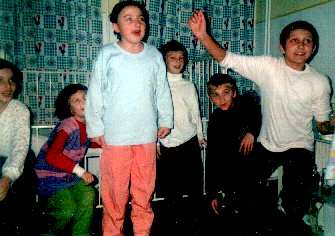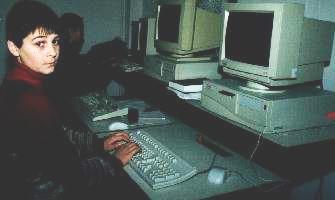Site search Web search Search this site or the web powered by FreeFind









 Click here to add this page to your favorites folder!
Click here to add this page to your favorites folder!Romanian faiths and their impact on society
January 2002, updated December 2004
Romania is composed of 85% Orthodox or Catholic, 2%
Protestant, and 3% Repenters. Of these professing people, 15% of each group are what could be considered true followers of Christ.
 )
Thus, for these people, it is not a problem for a Christian to sin because
salvation is by knowledge. This teaching pervades many
Repenter groups.
)
Thus, for these people, it is not a problem for a Christian to sin because
salvation is by knowledge. This teaching pervades many
Repenter groups.
On the opposite extreme are those who show
the fatalism of the European culture, considering themselves at
the mercy of demons or a vindictive god. I heard a pastor teach his
study group, "If your car doesn't start, you should figure out
what sin you are being punished for." The Bible verses I
presented couldn't convince them of God's forgiveness and that
perhaps, in such a circumstance, they should considering paying more
attention to auto maintenance. A lady who got a theology degree at
a baptista college in Bucharest told me that she doesn't remember anyone teaching her any differently. So, we launched a study on the
subject. However, Repenter indoctrination is hard to break. Once people
become Repenters, they either become solidly Christian or
staunchly anti-Christian. Few know that Christians are forgiven but still sinners (I John 1), free from the power
of sin (I John 5:4, 18; I Corinthians 10:13). They need to hear that, in Christ we
have authority over the demonic powers.(1 John 4)
One Repenter leader told me that he fearedpracticing even the most basic of Christian practices, the laying on of hands. He thought he would be overcome by evil spirits. I introduced him to verses that show that God in us is more powerful than he that is in the world. As we read in Acts 8:14 and 19:1-10, when the people didn't know about the Holy Spirit, they were not filled by
Him. I would think that those who avoid contact with Him would be in the
same situation, since God doesn't force Himself on us. Those
without the Spirit don't benefit from the guidance He can give (Acts
20:22). Since most Repenters substitute the Holy Spirit with the
pastor's rules and regulations, they easily find themselves more susceptible sin. They aren't used to listening to the Holy Spirit so don't recognize His voice.

As is typical of Europe, fatalism dominates their thoughts. Under communism, promotions and wages depended on having the right connections and keeping in the party's good graces. Being noticed or sticking out carried more risk than reward. A proverb goes, "He who sticks his head up gets it cut off." Thus, initiative was progessively destroyed. In the international arena, the entire nation was under the shadow of the USSR and was constantly hoping that the US would some day free them from communism. It is no wonder with these characteristics that Romania was one of the last to revolt in the 90's and still in 2003 debates whether times weren't better under Ceaucescu. Simultaneously, the US was conquering the West, the Plains, space, and the moon. This germinated two different peoples. Americans are known for their self-determination and independence and Romanians sense a lack of control over their destinies. Lieing and stealing were common practice during Communism that conveyed little sense of private property and this has carried over until today.
This fatalism applies in the spiritual arena as well. Once when I tried to encourage the basic Biblical practice of laying on of hands, a Repenter church leader in town didn't want to participate because he was afraid he would become posessed by a devil. Explaining that Jesus Christ's seating in the position of authority, I told him that such was impossible for a believer. He couldn't trust the authority of Christ enough to try. The leader of one Repenter missionary society from America told me that Christians don't have problems with sin. Thus, one has to come to think he doesn't sin or that sin is not a problem.
The Orthodox and Catholics generally know that as believers we have power over sin. We notice the fruit of the Holy Spirit in many of their lives. However, the Orthodox attend a church where they see a reconstructed Holy-of-Holies area like the Hebrew Temple had. This curtain of the temple that God tore in two (Matthew 27:51) has been reconstructed and people think that this encloses the place where God is. This might give them the idea that God does not see their everyday actions outside the church.*** Likewise, many Repenters have their women wear headcovering in church where they think that angels are but the majority of them go uncovered outside the church, assuming that angels don't see them there.
These practices forms the mental image, subconscious or conscious, that God and angels are located a specific location and few
live the idea that these celestial beings are everywhere, watching and working everywhere. This is
one way to explain why day-to-day ethics don't match church lives.
Corporal punishment is used in the home (a good practice, in my opinion) and in school (questionable). There is much less hugging and public affection towards children. Among most Repenter churches, laws are strict and pastors often obtain the authority given to God and are not to be questioned in matters of doctrine. Thus, the Holy Spirit is supplanted by the pastor making all decisions. In the couple of groups we have seen, we witnessed them decide who will baptize whom, who will marry whom and when, where a person will live, even what car she will buy. One Repenter pastor told his Bible study that if your car doesn't start, God may be punishing you for something. He wouldn't accept the Scripture I showed the group that He forgives us and forgets our sins. Thus, God is often seen as a punishing God, most people are more fearful than loving towards him. Psychologists show that
one who is afraid of authority is usually less obedient in the absence of that authority. These are all factors in the lack of ethics in Romania.
Pluralism has hit Romania in force. Child Evangelism Fellowship's Book of Questions gives us another example. It teaches that head knowledge is enough to allow entrance in Heaven. (I wrote to the group to bring their attention to what must be a careless mistake but they haven't responded.) This leads one to believe that as long as you KNOW that Jesus is the way to Heaven, you can FOLLOW any one you want. Thus, there is no need to love God with all your heart--the source of your will (i.e. make Him lord of your life). Yet, the Bible teaches this as a foundational principle in dozens of places including Acts 3:19 and Luke 9:23-24. We teach from the Bible: if you turn to God, you receive the Triune God, liberation from the power of sin, and eternal life. In Curtea de Arges, a city of 35,000, I have yet to find someone outside our group who believe this message. Thus, few people reach out in love to the needy orphans, not even to spend time with them when they don't work. Sadness, fruitlessness and aggravation are plagues that assault Romania. It can be lonely at times, but oh, the NEED!
To understand the Romanian worldview, read "Mission to Romania" For more information on how Repenters are affecting Romania, read Historical Parallels: Romania (Century XXI) v. Portugal (Century XVII) ++
"And while hard belief in predestination did not last more than a generation or two (it is not the kind of dogma that has lasting appeal), it was eventually converted into a secular code of behavior: hard work, honesty, seriousness, the thrifty use of money and time (both lent us by God).... It was the way [one worked] that mattered, and riches were at best a by-product.... Not yielding to the temptation of a higher leisure, good Calvinists kept at their task from generation to generation, accumulating wealth and experience along the way."*+
A beautiful Christian friend of mine is Cornelia. She comments that many Romanians enter ministry because
Westerners give them higher salaries without requiring study or hard
work.
One of the predominent issues that Protestants see when they encounter Catholic or Orthodox brothers and sisters, is that they believe in the activity of saints in the world. While it is true that this is unsupported in Scriptures, the former usually come from the other extreme: the influence of Western Christian missions which "have been one of the greatest secularizing forces in history." (Newbigin L. Honest Religion for Secular Man Philadelphia: Westminster, 1966) As do many tribal religions, the Orthodox faith sees the world as alive with saints who affect things in the world.
Because of the Ottomon Empire's dominence of the region, their religion was not subject to the Platonic dualistic movement and science based on materialistic naturalism. (This was the movement that caused the Protestants to abandon much of the belief in the interaction between spiritual and physical worlds in the 17th and 18th Centuries. (Bufford RK. The Human Reflex: Behavioral Psychology in Biblical Perspective San Francisco: Harper and Row, 1981. p. 30). A more balanced Biblical view would be to study and teach the role that God and angels (good and evil) play in our world.
 Another
problem we are adressing in Romania is the lack of education .
Richard Easterlin wrote, "Wider schooling typically precedes rapid
growth," Although the Orthodox don't see a conflict between science and
faith,* +* many Repenters devalue education. Many of them have told me that they thought
education gets in the way of faith. One pastor wrote that the
pursuit of life on other planet was killing people
and wasting money.& I am sure he is unaware of how he
benefits from the scientific advances that NASA and Sputnik yielded.
Another
problem we are adressing in Romania is the lack of education .
Richard Easterlin wrote, "Wider schooling typically precedes rapid
growth," Although the Orthodox don't see a conflict between science and
faith,* +* many Repenters devalue education. Many of them have told me that they thought
education gets in the way of faith. One pastor wrote that the
pursuit of life on other planet was killing people
and wasting money.& I am sure he is unaware of how he
benefits from the scientific advances that NASA and Sputnik yielded.
We need to bring more of the Biblical principles that  Protestants brought to western Europe. Like David Landes
of Harvard University writes, "The Protestant Reformation...gave a big
boost to literacy, spawned dissents and heresies, and promoted the
skepticism and refusal of authority that is the heart of
the scientific endeavor," * + invention, and
innovation. Most western money is going towards Repenter
groups that are adverse to mental development, science, and the
individual being guided by the Holy Spirit instead of by
pastor-formulated rules. This is disruptive to their spiritual,
mental, and societal development. Christians, as they have from the
time of Christ, "through [their] example of mutual love and by its
testimony of the grace of God, demonstrated that men can live a new
life." &&
Protestants brought to western Europe. Like David Landes
of Harvard University writes, "The Protestant Reformation...gave a big
boost to literacy, spawned dissents and heresies, and promoted the
skepticism and refusal of authority that is the heart of
the scientific endeavor," * + invention, and
innovation. Most western money is going towards Repenter
groups that are adverse to mental development, science, and the
individual being guided by the Holy Spirit instead of by
pastor-formulated rules. This is disruptive to their spiritual,
mental, and societal development. Christians, as they have from the
time of Christ, "through [their] example of mutual love and by its
testimony of the grace of God, demonstrated that men can live a new
life." &&
* (January 1, 2002)
** His parent denomination, the Evangelical
Free Church disagrees, citing I John. They write, however, that
they are inclusive and the missionary can teach this idea.
*** In America, by calling the church
building "The house of God", we can sometimes give the same impresssion.
+ Sibiu, Romania: 1998. pp. 36-37
++ La Brie L. Biserica Vox
Domini, Timisoara 15 iulie 2001
+++ The Protestant Ethic and the
Spirit of Capitalism. 1904
*+ Landes DL. The Wealth and
Poverty of Nations. New York: WW Norton & Co. 1994, pp. 175, 179
For a review of this book, click
here.
*+* " Biserica si
Stiinta"
+*+ Journal
of Economic Perspectives , Winter 2000
& Macavei T. Geocentricitate in
teologie, a criticism of the research towards life on other planets.
&& Companjen J.
"Francamente" Porte Aperte 7/2001 p. 2

